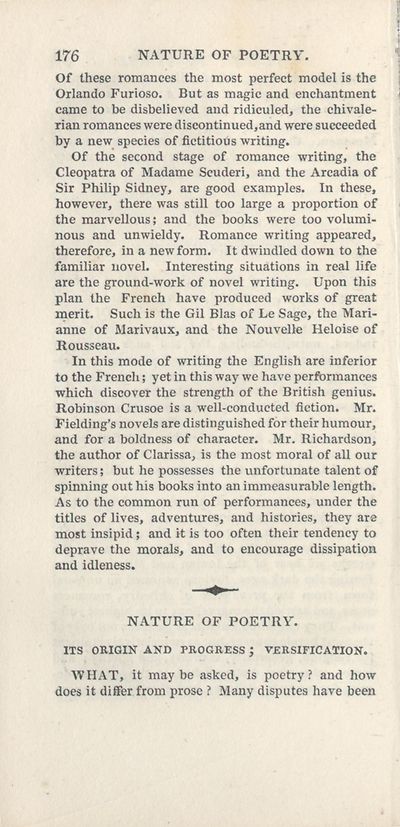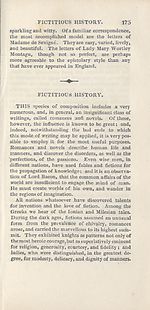Education > Essays on rhetoric
(204)
Download files
Complete book:
Individual page:
Thumbnail gallery: Grid view | List view

NATURE OF POETRY.
176
Of these romances the most perfect model is the
Orlando Furioso. But as magic and enchantment
came to be disbelieved and ridiculed, the chivale-
rian romances were discontinued,and were succeeded
by a new species of fictitious writing.
Of the second stage of romance writing, the
Cleopatra of Madame Scuderi, and the Arcadia of
Sir Philip Sidney, are good examples. In these,
however, there was still too large a proportion of
the marvellous; and the books were too volumi¬
nous and unwieldy. Romance writing appeared,
therefore, in a new form. It dwindled down to the
familiar novel. Interesting situations in real life
are the ground-work of novel writing. Upon this
plan the French have produced works of great
merit. Such is the Gil Bias of Le Sage, the Mari¬
anne of Marivaux, and the Nouvelle Heloise of
Rousseau.
In this mode of writing the English are inferior
to the Frencli; yet in this way we have performances
which discover the strength of the British genius.
Robinson Crusoe is a well-conducted fiction. Mr.
Fielding’s novels are distinguished for their humour,
and for a boldness of character. Mr. Richardson,
the author of Clarissa, is the most moral of all our
writers; but he possesses the unfortunate talent of
spinning out his books into an immeasurable length.
As to the common run of performances, under the
titles of lives, adventures, and histories, they are
most insipid; and it is too often their tendency to
deprave the morals, and to encourage dissipation
and idleness.
NATURE OF POETRY.
ITS ORIGIN AND PROGRESS ; VERSIFICATION.
WHAT, it maybe asked, is poetry? and how
does it differ from prose ? Many disputes have been
176
Of these romances the most perfect model is the
Orlando Furioso. But as magic and enchantment
came to be disbelieved and ridiculed, the chivale-
rian romances were discontinued,and were succeeded
by a new species of fictitious writing.
Of the second stage of romance writing, the
Cleopatra of Madame Scuderi, and the Arcadia of
Sir Philip Sidney, are good examples. In these,
however, there was still too large a proportion of
the marvellous; and the books were too volumi¬
nous and unwieldy. Romance writing appeared,
therefore, in a new form. It dwindled down to the
familiar novel. Interesting situations in real life
are the ground-work of novel writing. Upon this
plan the French have produced works of great
merit. Such is the Gil Bias of Le Sage, the Mari¬
anne of Marivaux, and the Nouvelle Heloise of
Rousseau.
In this mode of writing the English are inferior
to the Frencli; yet in this way we have performances
which discover the strength of the British genius.
Robinson Crusoe is a well-conducted fiction. Mr.
Fielding’s novels are distinguished for their humour,
and for a boldness of character. Mr. Richardson,
the author of Clarissa, is the most moral of all our
writers; but he possesses the unfortunate talent of
spinning out his books into an immeasurable length.
As to the common run of performances, under the
titles of lives, adventures, and histories, they are
most insipid; and it is too often their tendency to
deprave the morals, and to encourage dissipation
and idleness.
NATURE OF POETRY.
ITS ORIGIN AND PROGRESS ; VERSIFICATION.
WHAT, it maybe asked, is poetry? and how
does it differ from prose ? Many disputes have been
Set display mode to:
![]() Universal Viewer |
Universal Viewer | ![]() Mirador |
Large image | Transcription
Mirador |
Large image | Transcription
| Antiquarian books of Scotland > Education > Essays on rhetoric > (204) |
|---|
| Permanent URL | https://digital.nls.uk/113761940 |
|---|
| Description | Thousands of printed books from the Antiquarian Books of Scotland collection which dates from 1641 to the 1980s. The collection consists of 14,800 books which were published in Scotland or have a Scottish connection, e.g. through the author, printer or owner. Subjects covered include sport, education, diseases, adventure, occupations, Jacobites, politics and religion. Among the 29 languages represented are English, Gaelic, Italian, French, Russian and Swedish. |
|---|

